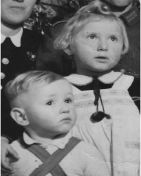Act I, scenes i–iv
Summary: Act I, scene i
Thunder and lightning crash above a Scottish moor. Three haggard old women, the witches, appear out of the storm. In eerie, chanting tones, they make plans to meet again upon the heath, after the battle, to confront Macbeth. As quickly as they arrive, they disappear.
Summary: Act I, scene ii
At a military camp near his palace at Forres, King Duncan of Scotland asks a wounded captain for news about the Scots’ battle with the Irish invaders, who are led by the rebel Macdonald. The captain, who was wounded helping Duncan’s son Malcolm escape capture by the Irish, replies that the Scottish generals Macbeth and Banquo fought with great courage and violence. The captain then describes for Duncan how Macbeth slew the traitorous Macdonald. As the captain is carried off to have his wounds attended to, the thane of Ross, a Scottish nobleman, enters and tells the king that the traitorous thane of Cawdor has been defeated and the army of Norway repelled. Duncan decrees that the thane of Cawdor be put to death and that Macbeth, the hero of the victorious army, be given Cawdor’s title. Ross leaves to deliver the news to Macbeth.
Summary: Act I, scene iii
On the heath near the battlefield, thunder rolls and the three witches appear. One says that she has just come from “[k]illing swine” and another describes the revenge she has planned upon a sailor whose wife refused to share her chestnuts. Suddenly a drum beats, and the third witch cries that Macbeth is coming. Macbeth and Banquo, on their way to the king’s court at Forres, come upon the witches and shrink in horror at the sight of the old women. Banquo asks whether they are mortal, noting that they don’t seem to be “inhabitants o’ th’ earth” (I.iii.39). He also wonders whether they are really women, since they seem to have beards like men. The witches hail Macbeth as thane of Glamis (his original title) and as thane of Cawdor. Macbeth is baffled by this second title, as he has not yet heard of King Duncan’s decision. The witches also declare that Macbeth will be king one day. Stunned and intrigued, Macbeth presses the witches for more information, but they have turned their attention to Banquo, speaking in yet more riddles. They call Banquo “lesser than Macbeth, and greater,” and “not so happy, yet much happier”; then they tell him that he will never be king but that his children will sit upon the throne(I.iii.63–65). Macbeth implores the witches to explain what they meant by calling him thane of Cawdor, but they vanish into thin air.
In disbelief, Macbeth and Banquo discuss the strange encounter. Macbeth fixates on the details of the prophecy. “Your children shall be kings,” he says to his friend, to which Banquo responds: “You shall be king” (I.iii.84). Their conversation is interrupted by the arrival of Ross and Angus, who have come to convey them to the king. Ross tells Macbeth that the king has made him thane of Cawdor, as the former thane is to be executed for treason. Macbeth, amazed that the witches’ prophecy has come true, asks Banquo if he hopes his children will be kings. Banquo replies that devils often tell half-truths in order to “win us to our harm” (I.iii.121). Macbeth ignores his companions and speaks to himself, ruminating upon the possibility that he might one day be king. He wonders whether the reign will simply fall to him or whether he will have to perform a dark deed in order to gain the crown. At last he shakes himself from his reverie and the group departs for Forres. As they leave, Macbeth whispers to Banquo that, at a later time, he would like to speak to him privately about what has transpired.
Summary: Act I, scene iv
At the king’s palace, Duncan hears reports of Cawdor’s execution from his son Malcolm, who says that Cawdor died nobly, confessing freely and repenting of his crimes. Macbeth and Banquo enter with Ross and Angus. Duncan thanks the two generals profusely for their heroism in the battle, and they profess their loyalty and gratitude toward Duncan. Duncan announces his intention to name Malcolm the heir to his throne. Macbeth declares his joy but notes to himself that Malcolm now stands between him and the crown. Plans are made for Duncan to dine at Macbeth’s castle that evening, and Macbeth goes on ahead of the royal party to inform his wife of the king’s impending arrival.





